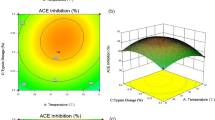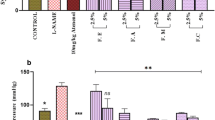Abstract
Long term regular intake of black tea (BT) can lower blood pressure, which is probably due to its antioxidant activity and angiotensin converting enzymes (ACE) inhibitory activity. This study achieves a comprehensive understanding of the relationship between bioactive compounds of BT and its ACE inhibitory activity and antioxidant activity. Phenolic compounds are closely related to antioxidant activity and ACE inhibitory activity. Catechin (C) exhibits stronger inhibitory activity on ACE enzyme than that of other compounds. Molecular docking demonstrates that C could directly bind to ACE active site pockets and Zn(II). Other bioactive compounds are involved in antioxidant and ACE inhibitory activity in varying degrees but no obvious trend is established. Our study proposes a conjecture that some bioactive compounds of BT regulate antioxidant defenses through mechanisms that involve ACE. The mixed mode of in vitro inhibition of ACE and oxidant of BT bioactive compounds needs to be further investigated.



Similar content being viewed by others
References
Kearney PM, Whelton M, Reynolds K, Muntner P, Whelton PK, He J (2005) Global burden of hypertension: analysis of worldwide data. Lancet 365:217–223
Mahdavi-Roshan M, Salari A, Ghorbani Z, Ashouri A (2020) The effects of regular consumption of green or black tea beverage on blood pressure in those with elevated blood pressure or hypertension: a systematic review and meta-analysis. Complement Ther Med 51:102430
NCD Risk Factor Collaboration (NCD-RisC) (2017) Worldwide trends in blood pressure from 1975 to 2015: a pooled analysis of 1479 population-based measurement studies with 19.1 million participants. Lancet 389:37–55
Stangl V, Lorenz M, Stangl K (2006) The role of tea and tea flavonoids in cardiovascular health. Mol Nutr Food Res 50:218–228
Hodgson JM, Devine A, Puddey IB, Chan SY, Beilin LJ, Prince RL (2003) Tea intake is inversely related to blood pressure in older women. J Nutr 133:2883–2886
Johnston JI, Franz V (1992) Renin–angiotensin system: a dual tissue and hormonal system for cardiovascular control. J Hypertens 10:13–26
Huang WY, Davidge ST, Wu J (2013) Bioactive natural constituents from food sources-potential use in hypertension prevention and treatment. Crit Rev Food Sci Nutr 53:615–630
Ajibola CF, Eleyinmi AF, Aluko RE (2011) Kinetics of the inhibition of renin and angiotensin I converting enzyme by polar and non-polar polyphenolic extracts of Vernonia Amygdalina and Gongronema Latifolium leaves. Plant Foods Hum Nutr 66:320–327
Pinciroli M, Aphalo P, Nardo AE, Añón M, Quiroga AV (2019) Broken rice as a potential functional ingredient with inhibitory activity of renin and angiotensin-converting enzyme (ACE). Plant Foods Hum Nutr 74:405–413
Hodgson JM, Puddey IB, Burke V, Beilin LJ, Jordan N (1999) Effects on blood pressure of drinking green and black tea. J Hypertens 17:457–463
Hodgson JM, Puddey IB, Woodman RJ, Mulder TPJ, Fuchs D, Scott K, Croft KD (2012) Effects of black tea on blood pressure: a randomized controlled trial. Arch Intern Med 172:186–188
Dong J, Xu X, Liang Y, Head R, Bennett L (2011) Inhibition of angiotensin converting enzyme (ACE) activity by polyphenols from tea (Camellia sinensis) and links to processing method. Food Funct 2:310–319
Persson IA, Josefsson M, Persson K, Andersson RG (2006) Tea flavonols inhibit angiotensin-converting enzyme activity and increase nitricoxide production in human endothelial cells. J Pharm Pharmacol 58:1139–1144
Zhang L, Santos JS, Cruz TM, Marques MB, do Carmo MAV, Azevedo L et al (2019) Multivariate effects of Chinese keemun black tea grades (Camellia sinensis var. sinensis) on the phenolic composition, antioxidant, antihemolytic and cytotoxic/cytoprotection activities. Food Res Int 125:108516
Ray S, Dutta M, Chaudhury K, De B (2017) GC–MS based metabolite profiling and angiotensin I-converting enzyme inhibitory property of black tea extracts. Rev Bras 27:580–586
Al Shukor N, Van Camp J, Gonzales GB, Staljanssens D, Struijs K, Zotti MJ et al (2013) Angiotensin-converting enzyme inhibitory effects by plant phenolic compounds: a study of structure activity relationships. J Agric Food Chem 61(48):11832–11839
Acknowledgements
This study was financially supported by the Fundamental Research Funds for the Central Universities (GK202003082), the Natural Science Foundation of Shaanxi Provincial Department of Education (2020KW-031), the National Natural Science Foundation of China (No. 31871801) and the College Students’ Innovation and Entrepreneurship Project (S202010718238).
Author information
Authors and Affiliations
Contributions
Linlin Wang and Lin Ma contributed equally to this study. Linlin Wang, Lin Ma, and Yike Zhao performed most of the experiments and data analyses. Guowei Shu, Jianke Li, and Li Chen helped supervised and discuss the work. All authors have given approval to the final version of the manuscript. Li Chen wrote the manuscript with critical input from all the authors.
Corresponding authors
Ethics declarations
Conflict of Interest
The authors declare no conflict of interest. This article does not contain any studies with human or animals’ subjects.
Additional information
Publisher’s Note
Springer Nature remains neutral with regard to jurisdictional claims in published maps and institutional affiliations.
Supplementary Information
ESM 1
(DOCX 41 kb)
Rights and permissions
About this article
Cite this article
Wang, L., Ma, L., Zhao, Y. et al. Comprehensive Understanding of the Relationship between Bioactive Compounds of Black Tea and its Angiotensin Converting Enzyme (ACE) Inhibition and Antioxidant Activity. Plant Foods Hum Nutr 76, 226–232 (2021). https://doi.org/10.1007/s11130-021-00896-6
Accepted:
Published:
Issue Date:
DOI: https://doi.org/10.1007/s11130-021-00896-6




